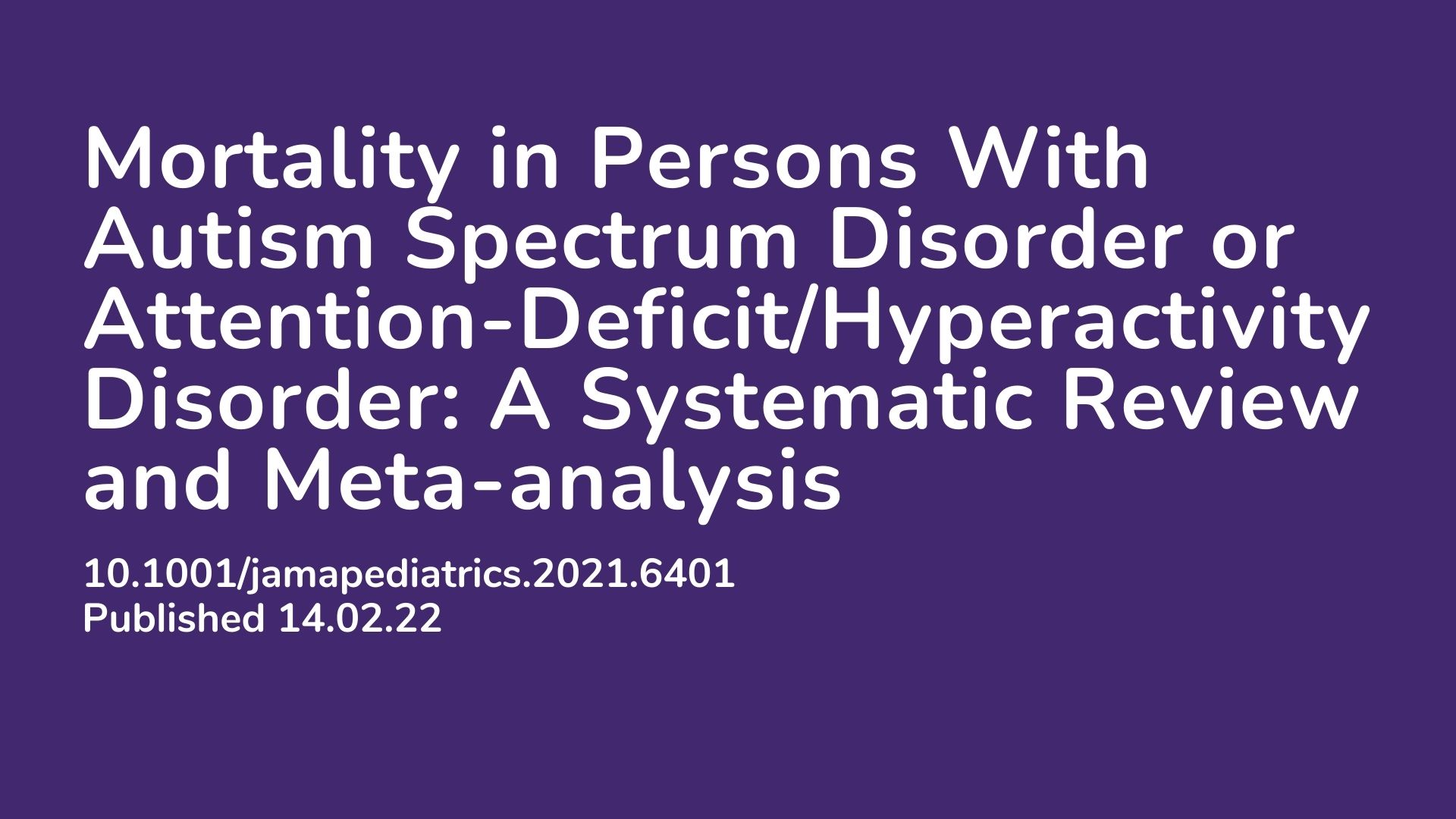Summary: Numerous studies have suggested that Autism Spectrum Disorder (ASD) and Attention Deficit Hyperactivity Disorder (ADHD) are associated with higher risk of mortality, however results have been inconsistent. In this systematic review and meta-analysis of 27 observational studies (with 642,260 individuals in total), the authors analysed causes of death amongst those with ASD and ADHD against the general population, to find a significantly increased risk of all-cause mortality. The authors looked at unnatural and natural causes of death, as well as age and gender. Several reasons have been suggested as possible contributing factors to these results, such as the social determinants of health, biology, comorbidities, neurological symptoms resulting in unintentional incidents, environmental factors and more. This paper is the most up to date synthesis there is of the current evidence. A better understanding of the contributing factors to all-cause mortality will mean that more specific preventative recommendations can be made to protect those with ASD and ADHD.
Abstract:
Importance: Autism spectrum disorder (ASD) and attention-deficit/hyperactivity disorder (ADHD) are childhood-onset disorders that may persist into adulthood. Several studies have suggested that they may be associated with an increased risk of mortality; however, the results are inconsistent.
Objective: To assess the risk of mortality among persons with ASD or ADHD and their first-degree relatives.
Data Sources: A search of MEDLINE, Embase, Scopus, Web of Science, and PsycINFO (published from inception to April 1, 2021) was supplemented by searching reference lists of the retrieved articles.
Study Selection: Cohort and case-control studies that reported mortality rate ratios (RRs) in persons with ASD or ADHD and/or their first-degree relatives compared with the general population or those without ASD/ADHD were included.
Data Extraction and Synthesis: Screening, data extraction, and quality assessment were performed by at least 2 researchers independently. A random-effects model was used to meta-analyze individual studies and assessed heterogeneity(2).
Main Outcomes and Measures: All-cause mortality in association with ASD or ADHD. Secondary outcome was cause-specific mortality.
Results: Twenty-seven studies were included, with a total of 642 260 individuals. All-cause mortality was found to be higher for persons with ASD (154 238 participants; 12 studies; RR, 2.37; 95% CI, 1.97-2.85; I2, 89%; moderate confidence) and persons with ADHD (396 488 participants; 8 studies; RR, 2.13; 95% CI, 1.13-4.02; I2, 98%; low confidence) than for the general population. Among persons with ASD, deaths from natural causes (4 studies; RR, 3.80; 95% CI, 2.06-7.01; I2, 96%; low confidence) and deaths from unnatural causes were increased (6 studies; RR, 2.50; 95% CI, 1.49-4.18; I2, 95%; low confidence). Among persons with ADHD, deaths from natural causes were not significantly increased (4 studies; RR, 1.62; 95% CI, 0.89-2.96; I2, 88%; low confidence), but deaths from unnatural causes were higher than expected (10 studies; RR, 2.81; 95% CI, 1.73-4.55; I2, 92%; low confidence).
Conclusions and Relevance: This systematic review and meta-analysis found that ASD and ADHD are associated with a significantly increased risk of mortality. Understanding the mechanisms of these associations may lead to targeted strategies to prevent avoidable deaths in high-risk groups. The substantial heterogeneity between studies should be explored further.
Article Publication Date: 14.02.22
DOI: 10.1001/jamapediatrics.2021.6401



